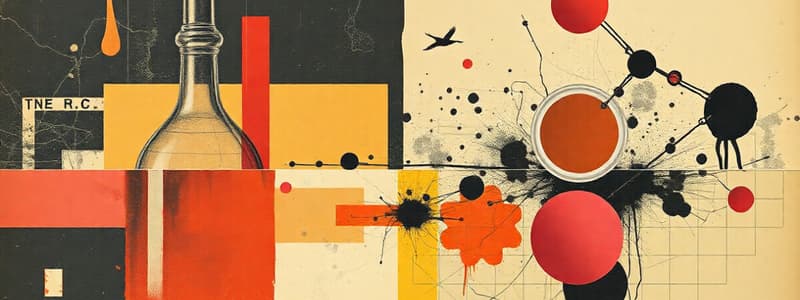Podcast
Questions and Answers
What typically occurs during a double replacement reaction?
What typically occurs during a double replacement reaction?
- A gas is produced
- An ionic solution remains unchanged
- An insoluble solid, or precipitate, is formed (correct)
- A liquid evaporates
A double replacement reaction always produces a gas.
A double replacement reaction always produces a gas.
False (B)
What is formed when two ionic solutions react in a double replacement reaction?
What is formed when two ionic solutions react in a double replacement reaction?
a precipitate
In a double replacement reaction, the precipitate settles and sinks to the ______.
In a double replacement reaction, the precipitate settles and sinks to the ______.
Match the following terms with their descriptions:
Match the following terms with their descriptions:
What is produced during a double replacement reaction involving NaOH and FeCl?
What is produced during a double replacement reaction involving NaOH and FeCl?
Acids produce OH- ions in solution.
Acids produce OH- ions in solution.
What is the pH level of acidic solutions?
What is the pH level of acidic solutions?
Compounds that produce OH- ions in solution are called ______.
Compounds that produce OH- ions in solution are called ______.
Match the following substances with their characteristics:
Match the following substances with their characteristics:
What is formed when lead(II) nitrate solution is mixed with sodium iodide solution?
What is formed when lead(II) nitrate solution is mixed with sodium iodide solution?
A precipitate is formed when sodium hydroxide solution is mixed with iron(III) chloride.
A precipitate is formed when sodium hydroxide solution is mixed with iron(III) chloride.
What two products are formed when sodium hydroxide solution is mixed with iron(III) chloride?
What two products are formed when sodium hydroxide solution is mixed with iron(III) chloride?
When two ionic solutions are mixed, they may form a __________.
When two ionic solutions are mixed, they may form a __________.
Match the following ionic compounds with their resulting products:
Match the following ionic compounds with their resulting products:
What is formed when an acid reacts with a base?
What is formed when an acid reacts with a base?
Acids and bases do not produce any water when they undergo a neutralization reaction.
Acids and bases do not produce any water when they undergo a neutralization reaction.
What is the chemical representation of an acid combined with a base?
What is the chemical representation of an acid combined with a base?
Phosphoric acid is commonly used as a primary ingredient in __________ remover.
Phosphoric acid is commonly used as a primary ingredient in __________ remover.
Match the following components with their roles in a neutralization reaction:
Match the following components with their roles in a neutralization reaction:
Flashcards
Double Replacement Reaction
Double Replacement Reaction
A chemical reaction where two ionic compounds exchange ions to form two new compounds.
Ionic Compounds
Ionic Compounds
Compounds formed by the attraction between oppositely charged ions.
Precipitate
Precipitate
An insoluble solid that forms during a chemical reaction in solution.
Insoluble Solid
Insoluble Solid
Signup and view all the flashcards
Double Replacement Reaction Solutions
Double Replacement Reaction Solutions
Signup and view all the flashcards
Ionic Solution
Ionic Solution
Signup and view all the flashcards
Double Replacement Reaction Products
Double Replacement Reaction Products
Signup and view all the flashcards
Formation of a Precipitate
Formation of a Precipitate
Signup and view all the flashcards
Neutralization Reaction
Neutralization Reaction
Signup and view all the flashcards
Acid
Acid
Signup and view all the flashcards
Base
Base
Signup and view all the flashcards
pH
pH
Signup and view all the flashcards
What is a base?
What is a base?
Signup and view all the flashcards
What happens in a neutralization reaction?
What happens in a neutralization reaction?
Signup and view all the flashcards
What is a salt?
What is a salt?
Signup and view all the flashcards
What is the general formula for a neutralization reaction?
What is the general formula for a neutralization reaction?
Signup and view all the flashcards
What is rust chemically?
What is rust chemically?
Signup and view all the flashcards
Study Notes
Double Replacement Reactions
- Double replacement reactions typically involve two ionic solutions producing two new ionic compounds.
- One of the new compounds often forms a precipitate which is an insoluble solid. This solid settles out of solution.
- Another compound may also form a precipitate or remain dissolved.
- General form: AB(aq) + CP(aq) → AD(aq) + CB(s)
- Example 1: Pb(NO₃)₂ + 2NaI → 2NaNO₃ + PbI₂
- Lead (II) nitrate solution mixed with sodium iodide solution yields lead (II) iodide as a precipitate.
- Example 2: 3NaOH + FeCl₃ → 3NaCl + Fe(OH)₃
- Sodium hydroxide solution mixed with iron (III) chloride solution produces iron (III) hydroxide precipitate.
Neutralization (Acid-Base) Reactions
- Acids are compounds that produce H⁺ ions in solution. Acidic solutions have a pH less than 7.
- Bases are compounds that produce OH⁻ ions in solution. Basic solutions have a pH greater than 7.
- When an acid and a base combine, they neutralize each other forming a salt and water.
- General form: HX + MOH → WX + H₂O
- X represents a negative ion, M represents a positive ion
- Example 1: Phosphoric acid (H₃PO₄) is a main ingredient in rust remover. Iron (II) hydroxide (Fe(OH)₂) reacts with phosphoric acid to dissolve it.
- 2H₃PO₄ + 3Fe(OH)₂ → Fe₃(PO₄)₂ + 6H₂O
Combustion Reactions
- Combustion is the rapid reaction of a compound or element with oxygen forming oxides and producing heat.
- Common examples involve organic compounds reacting with oxygen to form carbon dioxide and water.
- General form: CxHy + O₂ → CO₂ + H₂O
- Example 1: Methane (natural gas) combustion
- CH₄ + 2O₂ → CO₂ + 2H₂O
- Example 2: Acetylene combustion used in welding torches
- 2C₂H₂ + 5O₂ → 4CO₂ + 2H₂O
- Example 3: Glucose combustion
- C₆H₁₂O₆ + 6O₂ → 6CO₂ + 6H₂O
Studying That Suits You
Use AI to generate personalized quizzes and flashcards to suit your learning preferences.




